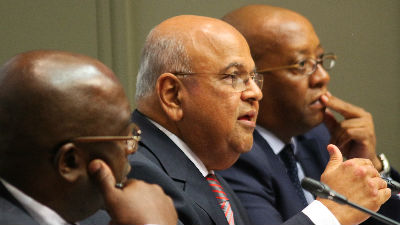Amidst global economic uncertainty and a weakened growth outlook for the next three years, South Africans are facing taxing times.
Finance Minister Pravin Gordhan today tabled the 2013/2014 Budget in Parliament. The budget places emphasis on the National Development Plan (NDP) and, specifically, social and infrastructural spending. According to Minister Gordhan, the country has seen the importance of long-term planning for development and change since 1994. However, there is a question as to whether we can sustain our “miracle”. In his Pointer for Pravin,Emil Maritsch, from Germiston, a small business owner, said: “the most important step is money for the implementation of infrastructure. Get roads, railways, harbours, border crossings, airways in tip top shape. Let the nation work and work hard, then all your spending will be re-paid fast and with dividends.” With regard to infrastructure, Gordhan said in his speech:“If we succeed in driving growth towards 5 percent a year and government revenue doubles in the next 20 years, major infrastructure project and new policy initiatives…will be affordable with limited adjustments to tax policy.” However: “if growth continues along the present trajectory, substantial spending commitments would require significant adjustments in revenue and reductions in other areas of spending.” This year a review of South Africa’s tax policy framework will be undertaken, which will focus on tax reforms in light of the recession, which has led to revenue expectations being too high. No “super-tax” for high income earners, or new mining taxes were introduced, despite expectations to that effect.Individual income tax relief to the tune of R7 billion was granted, but South Africans will have to pay more for petrol (15c increase in the general fuel levy), and alcohol and tobacco products. Government as a whole has had to tighten its belt, and the Budget places a big emphasis on fighting corruption and wasteful expenditure. A “green”, or carbon, tax of R120 per ton of CO2 equivalent is being introduced, effective 1 January 2015. “To soften the impact, a tax-free exemption threshold of 60 percent will be set, with additional allowances for emissions intensive and trade-exposed industries,” says Gordhan. “Over the long term” a National Health Insurance (NHI)-related tax increases “will be needed,”he added. Minister Gordhan says the world economy’s outlook remains “troubled”. South Africa’s economy has continued to grow, but at a slower rate than projected in the 2013 budget. “This is a budget in which there is limited room for expansion, yet there are significant opportunities for change,” says Gordhan. Looking to Africa “Africa is our home, and it is our future,” says Minister Gordhan. He says that the African market of over 1 billion people is growing rapidly. According to him, “The National Development Plan acknowledges the shift of economic power from West to East, and highlights the rise of Africa.” Trade patterns have shifted from the US and Europe to 18 percent of exports, and nearly 25 % of our manufactures exports, being to Africa. Cross-border financial regulations and tax requirements on companies are therefore to be eased and simpler rules will be introduced to reduce the time and costs of doing business in Africa. SIN TAXES Here is how much extra you can expect to fork out when indulging in your favourite tipple or puff:
Budget document downloads:
National Budget Speech(643kb)National Treasury Budget Highlights(2,173kb)People’s Guide to the Budget : Afrikaans(9,828kb)People’s Guide to the Budget : English(9,799kb)People’s Guide to the Budget : Setswana(9,880kb)People’s Guide to the Budget : Xhosa(9,802kb)People’s Guide to the Budget : Zulu(9,807kb)Tax Pocket Guide 2013(984kb)


